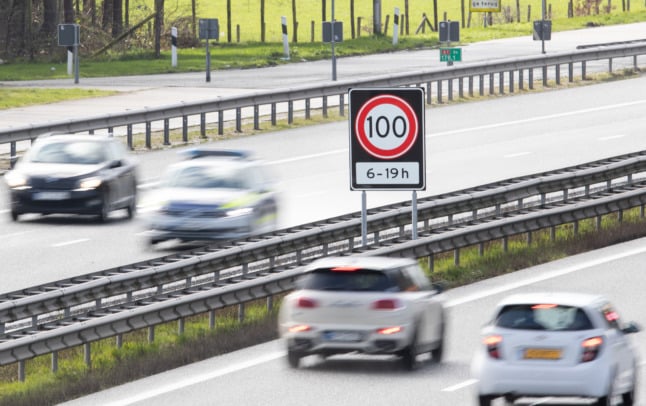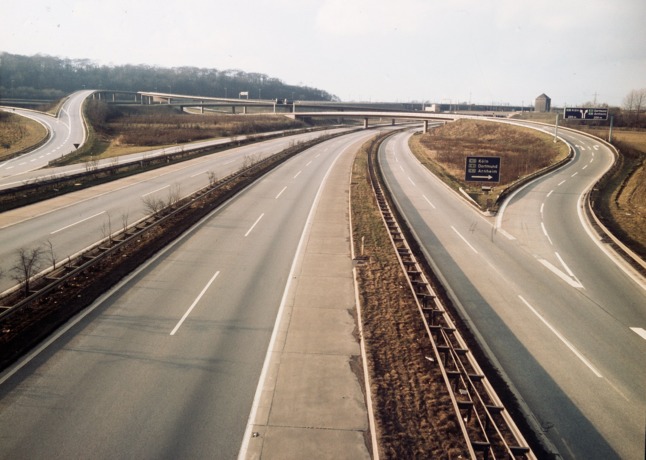Speed limits and 'home office': How Germany could reduce its oil consumption

As Germany struggles with its dependence on Russian oil, environmental groups and climate-conscious politicians have proposed ways of reducing this while also protecting the climate.
Germany’s dependence on Russian energy supplies means it's unlikely that the German government will be able to place a ban on oil imports like the one announced by the USA on Tuesday.
Both the Economics Minister Robert Habeck (Greens) and Chancellor Olaf Scholz (SPD) have also recently warned of grave consequences for Germany if such imports were to stop.
Russian oil imports are mainly processed in refineries into fuel and diesel, but are also used for heating and many German companies also use oil as a raw material and manufacturing lubricant.
READ ALSO: Russian energy imports ‘essential’ to Europeans’ lives, says German Chancellor
But another way around the issue could be to put in place measures that lead to reduction in oil consumption and for people to change their habits to conserve more energy. Here are some of the measures that have been proposed so far.
Driving speed limits
The controversial topic of introducing speed limits on the Autobahn is doing the rounds again, as both Greenpeace and the Environmental Action Germany have raised the issue again in the last week. They have claimed that a reduction in speed could save 3.7 billion litres of petrol and diesel, as well as 9.2 million tonnes of CO2.
They’re not only suggesting an introduction of a speed limit of 100 km/h on motorways, but also a reduction from 120 to 80 km/h on country roads and from 50 to 30 km/h inside towns for the duration of the current crisis.

Speed limit 100 is written on a traffic sign on a motorway on the border between the Netherlands and Germany. Phtoto: picture alliance/dpa | Friso Gentsch
Turning down the heating
According to the International Energy Agency, heating German households by one degree less would have an enormous effect on the annual demand for energy.
The Director of German think-tank Agora Energiewende, has stated that, if people lower their heating by 1-2 degrees, they can reduce the energy consumption in their household by at least 10-15 percent and, if they turning the radiators down when out of the room could save six percent of household energy demand.
Taking simple measures like this, and wearing warmer clothes could add up to a big impact on Germany’s overall energy consumption.
READ ALSO: How people in Germany can support Ukraine
Driving more carefully
The ADAC automobile association also recently pointed out that driving behaviours can also help lower fuel consumption and has listed useful tips on their website.
"Drivers can easily save up to 20 percent fuel by driving with foresight and not aggressively, by avoiding unnecessary short trips, power consumption (heating, cooling), and by driving with energy-saving tyres and optimal tyre pressure.
This behaviour could certainly reduce the annual fuel consumption of 52 billion litres in Germany by several billion litres, they have said.
Car-free Sundays

An archive photo from 1973 shows the view of the empty Duisburg-Kaiserberg motorway junction during the second Sunday driving ban due to the oil crisis. Photo: picture-alliance / dpa | Horst_Ossinger
The energy policy spokesperson of the SPD parliamentary group, Nina Scheer, has brought up a concept which was first implemented in Germany during the oil crisis in 1973.
So-called car-free Sundays (Autofreie Sonntage) she said "have not harmed us in the past and could also make a contribution today if a corresponding shortage requires it".
At the time, the government of Willy Brandt put in place four car-free Sundays, and Germans were banned from driving without a special allowance.
READ ALSO: Germany considers how to ease surging energy costs
Working from home
Another proposal put forward by Greenpeace is the continuation of the working from home model which has taken off during the pandemic, as many people in Germany travel to work by car.
According to their forecast, if 40 percent of workers continued to work from home on two additional weekdays (compared to the pre-Covid level), this would save 1.6 million tonnes of fuel per year.
Would there be support in Germany for these kinds of measures?
The jury is still out on that. As Germany is such a car-loving country, speed limits or car-free Sundays would likely be difficult.
But environmental group Greenpeace said in due to the war in Ukraine, people may ready to try these kinds of steps.
READ ALSO: EXPLAINED: How Germany could end its dependence on Russian energy
Asked if these kinds of measures are likely gain support from people in Germany, a spokesperson for Greenpeace told The Local: "Proposals such as a renunciation of leisure travel by car or more cycling on short distances, rely on the support of the population.
"In view of the broad solidarity with the people in Ukraine and the great rejection of Putin's war of aggression, society is overwhelmingly ready for such steps."
Comments
See Also
Germany’s dependence on Russian energy supplies means it's unlikely that the German government will be able to place a ban on oil imports like the one announced by the USA on Tuesday.
Both the Economics Minister Robert Habeck (Greens) and Chancellor Olaf Scholz (SPD) have also recently warned of grave consequences for Germany if such imports were to stop.
Russian oil imports are mainly processed in refineries into fuel and diesel, but are also used for heating and many German companies also use oil as a raw material and manufacturing lubricant.
READ ALSO: Russian energy imports ‘essential’ to Europeans’ lives, says German Chancellor
But another way around the issue could be to put in place measures that lead to reduction in oil consumption and for people to change their habits to conserve more energy. Here are some of the measures that have been proposed so far.
Driving speed limits
The controversial topic of introducing speed limits on the Autobahn is doing the rounds again, as both Greenpeace and the Environmental Action Germany have raised the issue again in the last week. They have claimed that a reduction in speed could save 3.7 billion litres of petrol and diesel, as well as 9.2 million tonnes of CO2.
They’re not only suggesting an introduction of a speed limit of 100 km/h on motorways, but also a reduction from 120 to 80 km/h on country roads and from 50 to 30 km/h inside towns for the duration of the current crisis.

Turning down the heating
According to the International Energy Agency, heating German households by one degree less would have an enormous effect on the annual demand for energy.
The Director of German think-tank Agora Energiewende, has stated that, if people lower their heating by 1-2 degrees, they can reduce the energy consumption in their household by at least 10-15 percent and, if they turning the radiators down when out of the room could save six percent of household energy demand.
Taking simple measures like this, and wearing warmer clothes could add up to a big impact on Germany’s overall energy consumption.
READ ALSO: How people in Germany can support Ukraine
Driving more carefully
The ADAC automobile association also recently pointed out that driving behaviours can also help lower fuel consumption and has listed useful tips on their website.
"Drivers can easily save up to 20 percent fuel by driving with foresight and not aggressively, by avoiding unnecessary short trips, power consumption (heating, cooling), and by driving with energy-saving tyres and optimal tyre pressure.
This behaviour could certainly reduce the annual fuel consumption of 52 billion litres in Germany by several billion litres, they have said.
Car-free Sundays

The energy policy spokesperson of the SPD parliamentary group, Nina Scheer, has brought up a concept which was first implemented in Germany during the oil crisis in 1973.
So-called car-free Sundays (Autofreie Sonntage) she said "have not harmed us in the past and could also make a contribution today if a corresponding shortage requires it".
At the time, the government of Willy Brandt put in place four car-free Sundays, and Germans were banned from driving without a special allowance.
READ ALSO: Germany considers how to ease surging energy costs
Working from home
Another proposal put forward by Greenpeace is the continuation of the working from home model which has taken off during the pandemic, as many people in Germany travel to work by car.
According to their forecast, if 40 percent of workers continued to work from home on two additional weekdays (compared to the pre-Covid level), this would save 1.6 million tonnes of fuel per year.
Would there be support in Germany for these kinds of measures?
The jury is still out on that. As Germany is such a car-loving country, speed limits or car-free Sundays would likely be difficult.
But environmental group Greenpeace said in due to the war in Ukraine, people may ready to try these kinds of steps.
READ ALSO: EXPLAINED: How Germany could end its dependence on Russian energy
Asked if these kinds of measures are likely gain support from people in Germany, a spokesperson for Greenpeace told The Local: "Proposals such as a renunciation of leisure travel by car or more cycling on short distances, rely on the support of the population.
"In view of the broad solidarity with the people in Ukraine and the great rejection of Putin's war of aggression, society is overwhelmingly ready for such steps."
Join the conversation in our comments section below. Share your own views and experience and if you have a question or suggestion for our journalists then email us at [email protected].
Please keep comments civil, constructive and on topic – and make sure to read our terms of use before getting involved.
Please log in here to leave a comment.